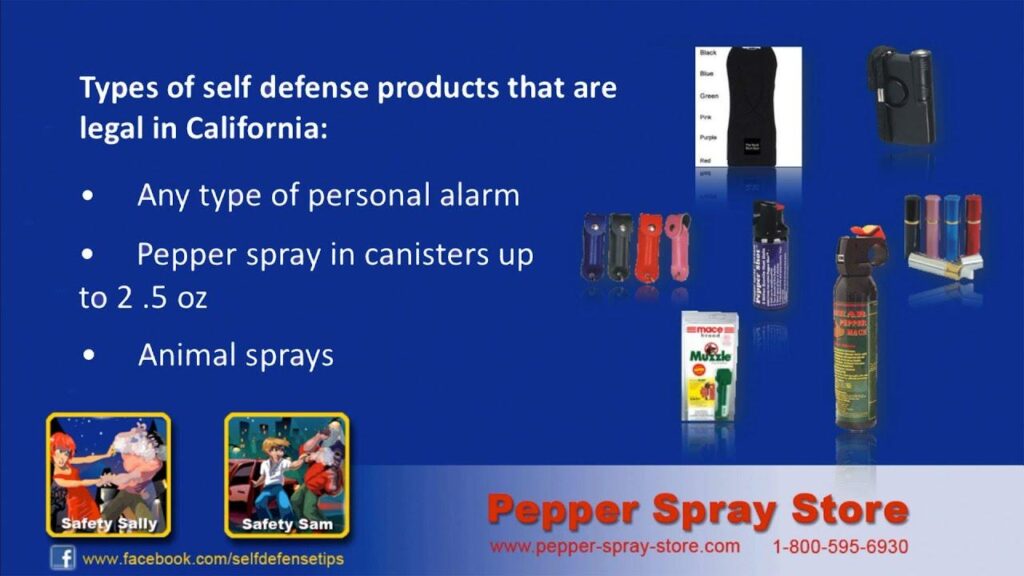Table of Contents
- Understanding Legal Requirements for Purchasing Pepper Spray
- State-by-State Variations in Pepper Spray Permit Regulations
- Choosing the Right Pepper Spray for Personal Safety and Compliance
- Tips for Safely Using and Carrying Pepper Spray Within the Law
- In Conclusion
Understanding Legal Requirements for Purchasing Pepper Spray
Before purchasing pepper spray, it’s crucial to be aware of the various legal intricacies that differ widely depending on your location. Many states and countries do not require a permit to buy or carry pepper spray, making it accessible for personal defense; however, some jurisdictions have strict rules on the size, concentration, and usage of the spray. Additionally, there might be age restrictions or prohibitions against carrying pepper spray in certain public spaces such as schools, government buildings, or airports. Familiarizing yourself with local legislation ensures you stay compliant and avoid any unintended legal consequences.
When preparing to purchase pepper spray, consider these essential points to stay within legal boundaries:
- Check state and local laws: Regulations can vary significantly even within the same country.
- Purchase from reputable sources: This guarantees the product meets legal standards for strength and packaging.
- Understand transportation rules: Some regions have restrictions on carrying pepper spray across state or country borders.
- Respect usage guidelines: Pepper spray is designed for self-defense only, and misuse can lead to criminal charges.
State-by-State Variations in Pepper Spray Permit Regulations
Understanding the legal landscape surrounding pepper spray can be tricky, as regulations differ significantly across the United States. Some states, like California and New York, mandate purchasers to obtain a permit or at least register the pepper spray with local authorities. In contrast, others such as Texas and Florida adopt a more lenient stance, allowing the purchase and possession without any formal licensing. For instance, in Massachusetts, residents are required to apply for a Firearms Identification Card to legally carry pepper spray, which adds an additional layer of scrutiny. This variation is largely driven by differing state perspectives on self-defense and public safety.
Besides permit requirements, several states impose restrictions on the size, concentration, and composition of pepper spray canisters. Common stipulations include:
- Maximum spray volume limitations to prevent misuse or excessive force.
- Prohibitions on specific chemical agents deemed hazardous beyond basic deterrence.
- Age restrictions mandating buyers to be 18 or older.
Navigating these rules is essential not only to stay compliant but also to ensure your protection method aligns with local laws. Always check your state’s regulatory authority or a trusted legal resource before purchasing or carrying pepper spray.
Choosing the Right Pepper Spray for Personal Safety and Compliance
When selecting pepper spray, it’s essential to consider both its effectiveness and adherence to local regulations. Opt for sprays that offer a balance between range, spray pattern, and concentration of active ingredients such as Oleoresin Capsicum (OC). Gel or foam formulas tend to provide more accuracy and less blowback compared to traditional sprays, making them a good choice for crowded areas or windy conditions. Additionally, carrying pepper spray with a compact, easy-to-use design increases the likelihood of quick deployment during emergencies.
Compliance with the law cannot be overlooked. Different jurisdictions have varying restrictions regarding the size, strength, and type of pepper spray that can be legally purchased or carried. Before making a purchase, ensure that the product:
- Meets the permitted OC concentration limits in your area
- Is approved or labeled for civilian use
- Does not exceed weight or volume restrictions
Consulting local laws or reputable retailers helps prevent legal complications and ensures you choose a product that enhances your safety without risking penalties.
Tips for Safely Using and Carrying Pepper Spray Within the Law
When carrying pepper spray, always ensure it is easily accessible but securely fastened to avoid accidental discharge. Consider using a dedicated holster or keychain attachment designed for quick deployment. Store it at body height, such as clipped to a belt or bag strap, so you can reach it instantly in an emergency. Additionally, regularly check expiration dates and inspect your spray to confirm it functions properly; expired canisters lose potency and reliability, which could jeopardize your safety when needed most.
Understanding local regulations is crucial to avoid legal trouble. Many jurisdictions require pepper spray to be below a certain concentration or restrict its possession in specific places like schools, airports, or government buildings. Keep these essential safety practices in mind:
- Never use pepper spray in a way that could harm bystanders or pets
- Use it solely for self-defense and only when faced with a legitimate threat
- Familiarize yourself with the laws surrounding purchase, carrying, and usage in your area
- Practice deploying your spray safely to ensure quick and confident use if necessary
In Conclusion
In summary, whether or not you need a permit to purchase pepper spray largely depends on your location and local regulations. Before making a purchase, it’s crucial to research the laws specific to your state or country to ensure you’re compliant. Understanding these rules not only helps you stay legal but also guarantees that you can effectively use pepper spray for self-defense when needed. Stay informed, stay safe, and make your personal security a top priority.Check Our Other Blogs
- StunGun – Your Trusted Source for Stun Guns, Laws, and Self-Defense Tips
- PepperSprayLaws – Your Trusted Resource for Pepper Spray Information
- StunGunLaws – Your Trusted Guide to Stun Gun Legality and Safety




